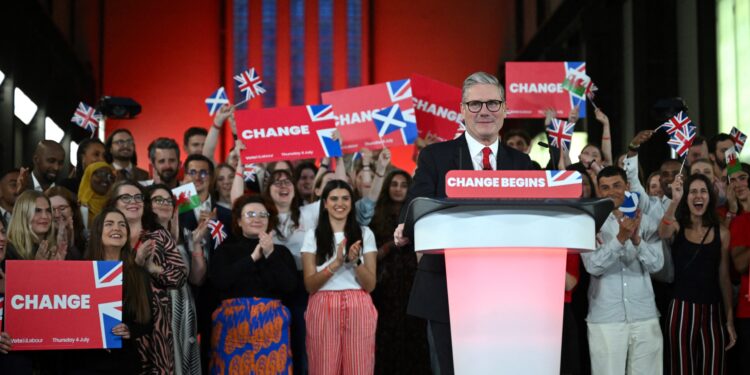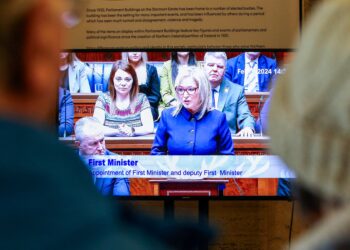Brussels – The first post-Brexit UK election was historic in many ways, for the landslide of seats that the Labour Party won, for the unprecedented collapse of the Conservative Party, and for the return to the shadows of the Scottish National Party. There was also the Liberal Democrats’ most convincing electoral showing in just over 30 years of political existence and the appearance on the scene of Nigel Farage’s Reform UK sovereignists (elected at their eighth attempt). But also for other data that offer significant insight: the newly elected House of Commons will have the highest ever representation of women – 242 female MPs – but in the face of one of the lowest turnouts since 1885, standing at 59.8 percent.

“We did it! Change starts now,” were the first words of the Labour leader, Keir Starmer, after the announcement of the partial results of yesterday’s (July 4) election: “We need a changed Labour Party, ready to serve our country, ready to bring Britain back to the service of working people.” With 412 seats won in the House of Commons – the best electoral performance since Tony Blair in 1999 and 2001 – Labour now has a vast majority to govern (the minimum threshold is 326) and, by this morning (July 5,) outgoing Conservative Premier, Rishi Sunak, is expected to resign at Buckingham Palace before the appointment of Starmer by King Charles III. After that, the Labour leader will travel to 10 Downing Street around lunchtime and deliver his first speech as Britain’s new head of government.
Top leaders of European Union institutions immediately congratulated Starmer, observing the election in the Post-Brexit UK from the outside (for the first time since 1973, when London joined the European Economic Community): “I look forward to working with you in a constructive partnership to address common challenges and strengthen European security,” said EU Commission President, Ursula von der Leyen. The head of the European Council, Charles Michel, spoke of a “new cycle” and invited the next tenant of Downing Street 10 “European Political Community meeting on 18 July in the UK where we will discuss common challenges, including stability, security, energy, and migration.” The President of the European Parliament, Roberta Metsola, also congratulated Starmer, recalling that “the relationship between the EU and the UK is rooted in our shared values and longstanding friendship” and “As allies and partners, it is in our common interest to continue working closely together.”

The other side to the coin of the landslide of Labour seats is a bitter defeat for the Tories of outgoing PM Sunak, which collapsed to 121 seats in the House of Commons (-244). It is the worst result in the history of the British Conservatives since its founding in 1834 and came after 14 years of government and five different cabinets, from David Cameron between 2010 and 2016 to Sunak’s last two years, through Theresa May and Boris Johnson when the UK exited from the European Union and Liz Truss (not re-elected yesterday) who lasted just 45 days in the fall of 2022. The Conservatives’ almost catastrophic result (more than 7 million votes lost since the 2019 victory) can be viewed as the epilogue of the political suicide for Sunak, who called early elections in late May, even if the Tories will still remain the main opposition party to Labour. The real unknown will now be the direction the Conservatives will take, particularly in the face of the wave of sovereignists and populists of Reform UK, which won only five seats – including that of their leader and architect of Brexit, Farage – but came in third in terms of preferences: with 4.1 million votes they rose to third place among parties in the UK.
The electoral system in the United Kingdom is referred to as first past the post, or dry majoritarian: in each of the 650 constituencies in England, Wales, Scotland, and Northern Ireland, the candidate who gets more votes is elected MP. Although it tends to ensure greater governability, at the same time, it can mask some critical elements of the ballot box result. For example, in the July 4, 2024 election – with the second lowest turnout in 150 of British democratic history (only in 2001 did it reach 59.4 percent) – there is a risk of not noticing that Starmer’s Labour lost about 600,000 preferences compared to five years ago, when, under Jeremy Corbyn, they were collapsing to the worst result since 1935 in terms of seats in the House of Commons (202): but with turnout at 67.3 percent in 2019, they stood at 40 percent and 10.3 million votes. Also, Farage’s sovereignists are only 9 percentage points behind the Conservatives (14.3 vs. 23.7) and 2.8 million preferences – despite the seats saying 120 to 5 -while Labour is at 33.8 percent with 9.6 million votes. The next few months and years will tell whether the new Tories leadership will move toward an attempt to win back voters lost to Reform UK – with a tightening of nationalist, Euroskeptic, and anti-immigration positions – or whether they will attempt a turn to the center to take back the vast amount of constituencies that have changed hands from Labour, especially in England.

It is also noteworthy the convincing electoral outcome for the Liberal Democrats, who managed to elect 72 MPs (with 3.5 million preferences, about 600,000 fewer than Reform UK). It is the party’s best performance since its founding in 1988 and a new ascent to third place in the House of Commons, given the parallel collapse of the Scottish National Party to 9 seats (-39 compared to 2019) and the return to the shadows after the nine years of strong leadership of Nicola Sturgeon between 2014 and 2023. After the party funding scandal in early 2023, Sturgeon’s resignation did not change the priority of a new referendum on Scotland’s independence from the United Kingdom on the agenda of successors Humza Yousaf and John Swinney, with the condemnation of Brexit and its economic consequences as the driving factor. Yet defeats in the vast majority of constituencies in the 2024 election to Labour and the Liberal Democrats can be interpreted as the end of the independence dream and the realization among Scottish voters that better representation in the ruling party can provide a better prospect than what has been achieved since 2015 by the nationalist formation.
Completing the picture in the House of Commons are the 7 Northern Irish Republican MPs of Sinn Féin, the 5 Northern Irish Protestants of the Democratic Unionist Party, the 4 Welshmen of Plaid Cymru, and the 4 of the Green Party (with an 800,000 electoral feat to 1.9 million preferences gained from 2019 to date), as well as 5 other elected members of minor parties and 6 independents, including former Labour leader Corbyn. A final data point to consider is the decline in the overall share of total Labour and Conservative MPs (533) – the lowest since 1931 (522) – which, for the first time in the UK’s modern history, could lead to deep reflections on the same dry majoritarian system in place and to more pressing calls for a more proportional electoral system from parties that leaped ahead, Reform UK, and its leader elected to Parliament above all.
English version by the Translation Service of Withub






